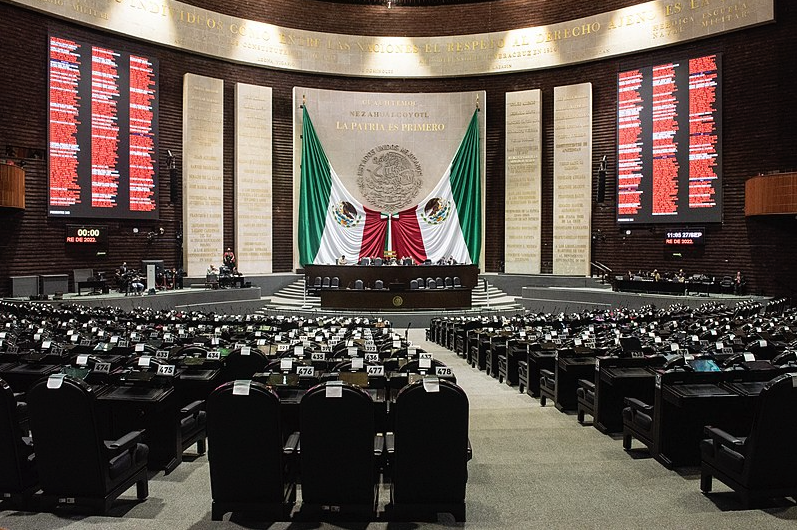The electoral triumph of Claudia Sheinbaum, presidential candidate of the “Juntos hacemos historia” coalition, was unexpectedly accompanied by the news that the parties of this coalition could, added together, have the qualified majority in both legislative chambers. This would mean that, at least in the next three years, there would be no legislative counterweights to the presidential power.
This fact provoked reactions, a segment of the social opposition posted on social networks the hashtag #Megafraud with images of errors and inconsistencies in the minutes that did not correspond with the PREP minutes and questioned the quick counts. Meanwhile, the political opposition, grouped in the coalition “Fuerza y Corazón por México”, after recognizing Claudia Sheinbaum’s victory, demanded the review of 80% of the tally sheets, and not the 60% offered by the National Electoral Institute (INE) to review possible errors and inconsistencies before taking the results before the magistrates of the Federal Tribunal of the Judiciary of the Federation (TEPJF for its acronym in Spanish). These will ultimately be in charge of judicially processing the appeals.
The “vote by vote, precinct by precinct” review policy that has been practiced since the 2009 elections has not caused major modifications in the electoral results. And given the overwhelming difference of 30 points between the ruling party’s candidate and the opposition candidate, it is likely that the count will not go any further and the preliminary results released by INE will be ratified.
However, there could be changes in the Congress of the Union, where the winning coalition could fall short of the 84 senators required for a qualified majority.
What is over-representation?
In the Mexican Constitution, over-representation means that a political party obtains, based on certain electoral mechanisms, a percentage of seats 8% higher than the percentage of votes obtained. In addition, the Constitution establishes that no party should have more than 300 of the 500 deputies who constitute the Chamber of Deputies.
However, the parties of the winning coalition nominated common candidates in many of the 300 electoral districts and transferred votes from one party to another, which is unconstitutional. With those votes, as a coalition, the limit of 300 deputies is exceeded by far, which, if it is valid for the parties, is valid for the coalitions, as it happens in different provisions of Article 41. The Constitution contemplates the over-representation, but not accumulated, as the winning coalition is trying to do today, which reaches 18% and which, doing justice to the principle of “one vote, one citizen”, would have to be redistributed among the different benches.
Now, if the majority of the INE counselors, making a literal reading of the Constitution, give it a favorable treatment, they would be rejecting a substantive interpretation of the spirit of the Constitution expressed in Article 41.
If so, the magistrates of the TEPJF will have to resolve the dilemma between proceeding according to the spirit of the Constitution or according to the grammaticality of the law. This would be a historic decision because of what it would mean for the separation of powers, the necessary counterweights in any democracy, and the safeguarding of citizens’ rights and liberties.
The risks of overrepresentation
If the next government were to have absolute control of the Congress of the Union, it could run the risk of consolidating an autocratic vision of power. This would put an end to the plurality built during the long transition to democracy, which provided the country with controls over political power. With the majorities that the new government would have, it would have everything it needs to rewrite the Constitution and the laws.
A country without checks and balances does not imply per se an authoritarian regime. However, the 20 constitutional reforms that AMLO has proposed, among them the political control of the Supreme Court of Justice of the Nation, suggests that if sent to the Congress of the Union in September and voted with the new super majority, he could submit the Judicial Power to the Executive as authoritarian Latin American governments have done. For this, however, López Obrador should count on the support of Claudia Sheinbaum, who has already anticipated the outgoing president of the need to open the debate on the proposed reforms.
Regardless of what the ruling party may end up deciding regarding these proposed reforms, counterweights are essential to strengthen institutions and minimize the risks of the emergence of authoritarian governments. Regimes such as the one Mexico experienced during the long PRI period, which remained in power for 71 years until the citizens put an end to it in the year 2000 with their vote.
*Translated by Janaína Ruviaro da Silva from the original in Spanish.













